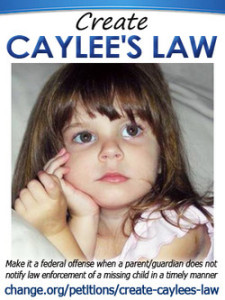
If you don't, you got some 'splainin' to do. And if your story doesn't add up, you can be charged. It is not unreasonable to expect parents/guardians to report their child missing or deceased within a short amount of time of discovering them so. If the child is under 12, as the Caylee's Law model states, society expects you to know where that kid is to within a rather short window of time.
The law is not meant to punish you for putting your child peacefully to sleep at 9 and not discovering disaster until morning. But it does state you will have failed your duty to your child and to society if you don't take action when you do make the discovery.
I know there is the occasional mixup of custody situations where Parent A thought Parent B was picking up Junior while Parent B thought Aunt Q was doing so and Aunt Q thought summer camp ended at 5pm when it really ended at 2pm and thought Parent A was doing the picking up anyway. In this scenario, a few hours can go by before anyone really knows Junior isn't where he's supposed to be. I have faith that law enforcement can sort these situations out. The hallmarks will be the confused time period will be relatively short, everyone's story adds up, everyone cooperates and the mishap is, in fact, reported as soon as someone realizes Junior needs help.
The forensic anthropologist in the New Scientist article gives a scenario where a kid gets into a farm accident but is not missed until after dinner. I have faith Law Enforcement can sort that one out, too. This is not about MEs trying to prove a kid died at 1 pm (parent charged) or at 2 pm (parent not charged). This is about a parent properly seeking the child's whereabouts and summoning help when needed. This is about not allowing adults to harm very small bodies, bodies who are mostly off-the-grid because they aren't even in school, and hiding them until the evidence degrades and vanishes.
There is no scenario on earth where a legally sane parent loses a young child or observes the death of a young child and summons no help or does not arrange for proper handling of remains and legal death certificate for several weeks without that parent being directly involved in the mishap that befell the child. The parent either sent the child off somewhere, perhaps in a custody battle; sold the child; harmed the child; is protecting a party who caused harm to or trafficked the child.
Law enforcement should be armed with a tool to make that person talk or be removed from society.
Whether you have faith in the jury that released Casey Anthony or not, this law is the right idea because it is absolutely indisputable that Casey Anthony allowed both public and private resources to be poured for 6 months into the search for a child she knew to be unrecoverable and deliberately diverted suspicion to an innocent stranger (Zenaida). Those resources could have gone to other missing children and other suspects in real crimes.
With Caylee's Law in place, the Orange County Sheriff's Dept. could have pressured Casey Anthony into admitting the death of Caylee within 72 hours of Cindy Anthony's frantic 911 call. At that critical juncture, Casey was gambling that she could stall for more time and, when the time came, roll the dice on a murder charge. With her success at confabulation, she had every reason to think her odds were good.July 5, 2011 proved her to have backed the right horse, her own stalls and stories.
But with an arrest and certain conviction for not reporting Caylee missing for a month staring her in the face that first night, Casey would have known she had nowhere to hide. She might have been more frightened, more rattled, more willing to make deals in the here and now. Casey would have had much more incentive to cut her losses and cough up the truth that Caylee would not be found alive. Even if she had held firm that night, if there had been such a law in 2008 she would now be paying for that hideous insult to her child's well-being and to the community's.
With Casey's acquittal and insouciant midnight stroll out of jail just days later, other murderers and battering parents will be emboldened to make the same gamble Casey did. Why shouldn't they? She gave a Master's Course in how to do it and get away with it.
Sorry, New Scientist Magazine, Caylee's Law is not about a forensic precision all of us--all but certain juries drunk on CSI, that is--know is not possible. Caylee's Law is about tipping the odds back again. Caylee's Law is about backing the children.
Camille Kimball's books are:
The Mammoth Book of Tough Guys
No comments:
Post a Comment